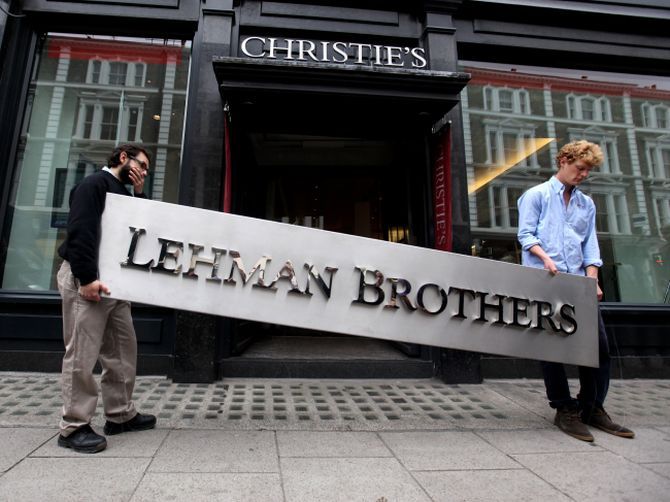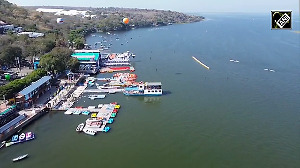'I can confidently say there will be another financial crisis soon enough, and probably more than one global crisis within the next century, given the increasingly integrated nature of the global economy.'

India may have been relatively unscathed in the 2008 global financial crisis set off by the crash of Lehman Brothers, but its vulnerabilities to another round of financial tremors have only increased in the last 10 years.
Flush with foreign funds in the wake of global central banks pumping in money like there was no tomorrow in the aftermath of the 2008 crisis, India, and other emerging markets, are seeing the downside now as the developed markets see relative stability and interest rates slowly head north, sucking out FII funds in the process and rattling the EMs.
Has the world turned a safer place in the last 10 years?
How vulnerable is India if another round of financial meltdown were to happen?
Dr P T Rajan, who was head of offshore capital markets, Lehman Brothers in 2008, believes there will be another crisis soon enough, and India, which was merely singed 10 years ago, could be worse off this time round.
Dr Rajan, below, who has had a change of careers since then, becoming a legislator from Madurai, his hometown, on behalf of the Dravida Munnetra Kazhagam, tells Rediff.com's Saisuresh Sivaswamy that India's financial sector is in a worse shape, and "I don't see any clear path from here to a revitalised financial sector either."
It's been 10 years since the Lehman Brothers crash and the global tumult that followed the last few days, weeks, must have been a roller-coaster of emotions for you.
The weeks preceding and following September 15, 2008, were the most intense period of my life, and I will never forget those days.
I learnt more about human nature and extreme conditions (where logic is stretched or fails) then, than in any 5-year period before or since.
But in many ways, it feels like a lifetime ago, especially as I've been in public service and active politics over the past couple of years. I've done so many different things in so many different places in the last decade, that those events feel like a distant echo now.
You were right there in the epicentre, so to say, even though you were based in Mumbai, can you take us through those days? When did you get the first inkling that things would go down?
I knew our situation was tenuous for weeks, and increasingly so every week. But as an expatriate posted in Mumbai, I was not privy to happenings at a detailed level. Had I stayed in New York, I think I would have been much more aware of developments.
In fact, I would likely have been involved in the efforts myself, because I worked directly under the people that were critical to the last-minute rescue options: Alex Kirk (my last manager in New York) the last president of the bank, Bart McDade (who had brought Alex back to Lehman very near the end, after he'd quit a few months earlier).
Because my background was quite atypical (and included a previous career in consulting), they had assigned me several special projects over the years, including working with regulators to set up a commercial bank in Utah, and traveling to Tokyo multiple time in an attempt to secure a strategic equity investment from one of the Big 3 Japanese banks.
But sitting in Mumbai (I was posted to India after my father passed away so I could be closer to my mother), away from the actual meetings, it never occurred to me that Lehman would be allowed to fail.
I've recounted my memories of the events of September 15, 2008, on multiple occasions, sometimes in great detail -- there's even a version available on YouTube. In the interests of time and limited space, I will not go into them again here.
Suffice to say that the first time I actually contemplated failure was when I got a call from the general counsel's office in New York (at 9:30 am Monday morning Mumbai time, and midnight Sunday New York time), saying the regulators had asked us to file for bankruptcy.
Even then I could not fathom how the financial system could absorb such a massive shock, since I knew the extent of the Derivative Risk books of the bank in some detail based on my previous roles.
Is there a Lehman Brothers Old School Boys network that you are part of? Do you folk meet up and look back at what could have been done differently?
I think shared experiences bind people together, and if that shared experience is traumatic, then the ties are even stronger.
Most of us are so busy with our careers and obligations in various parts of the world that I don't meet old colleagues in person very often. But the world is so connected electronically now that we're constantly in touch (calls, e-mail, social media, etc).
By grace, most of my old colleagues are doing well professionally and personally. We don't spend too much time second-guessing what happened, especially because it seems so long ago now.
Of course, we reminisce about the old days in general, much as old classmates do. Don't forget, many of us based in New York (as I was till 2007) experienced in close proximity the tragic events of 9/11 also, since Lehman's then offices in the World Financial Centre (which we had to abandon due to the damage from the North Tower's collapse) were next door to the WTC. That's a double-dose of shared trauma.

You said at an interaction that the regulators and policy-makers had no clue of the impending crisis. Why was it so?
Actually, what I said was that they had no clue as to the seismic nature of the calamity that would befall the global financial markets, and eventually the global economy, by allowing Lehman to fail.
Innovation in securitisation and derivative pricing and structuring, as well as actual distribution of risk globally had happened at such a pace during the 2001-2008 period that most regulators simply had no understanding of the scale and scope of the problem that would arise if Lehman failed.
In that sense, they took an ill-informed decision, which some of them had the integrity to acknowledge/admit later.
Too Big To Fail. Four epochal words to emerge from that crisis. Why didn't this dictum apply to Lehman?
Why was it allowed to fail when others like Merrill Lynch were not?
I am asking this because you had said elsewhere that 'We had set ourselves up to fail'.
Lehman was allowed to fail (unlike Bear Stearns earlier, or Merrill Lynch or AIG later) because regulators were politically driven to demonstrate that they were not encouraging Moral Hazard.
The combination of political pressure to establish that principle, and lack of awareness of the costs of doing so, suggests in retrospect that some institution would have been allowed to fail before enlightenment set in.
That is, there was going to be one victim before policy considerations trumped political ones -- a ritual sacrifice for appeasement of the political demands, if you will.
But that victim need not have been Lehman.
My perspective on the internal developments in Lehman leading up to that moment (the long track-record of success, a false sense of invincibility that arose from that record, the consequent imprudent risk decisions, and the personnel departures and replacements arising as a result of disagreement over risk levels) is that our own actions greatly increased the odds of Lehman being that one inevitable victim.
Of course, we could not have possibly known in advance that events would conspire to require a ritual sacrifice...
Being a bystander and not a participant, India was merely singed in the crisis, but we didn't go under.
Many say that this was also due to our strong regulatory mechanism supervised by the central bank.
The word 'regulation' often has a negative connotation, but for a pre-adult economy like India's, maybe a bedrock of strong regulations is a necessity to stave off crises?
India's relative insulation from the global financial markets, and antiquated banking model, were the main reasons for the 'relatively unscathed' outcome during the last crisis.
To my understanding of both markets and regulations, I would not say that India had, or has, a regulatory system to brag about.
The one-time exemption (granted by the RBI post the crisis) which allowed banks to restructure loans without first classifying them or setting aside reserves is an example of a shoddy regulatory response, in my opinion.
I recommend a recent article (external link) as another perspective on the limitations of regulatory oversight in India.
In the last 10 years, would you say the world has learnt its lessons and that the worst of the financial crisis is behind us?
Or is it like karma, and will keep coming back?
There's an adage that memories are short in the markets. Financial/market crises have been a regular feature of history for hundreds of years, going back to the Tulip Crisis and the South Sea Company bubble, even within the last 500 years.
Crises are inevitable in markets, and they occur because of the limited rationality of human beings, both individually, as well as in crowds.
As such, I can confidently say there will be another financial crisis soon enough, and probably more than one global crisis within the next century, given the increasingly integrated nature of the global economy.
However, as regulators or policy-makers, we should not neglect our obligations to continuously improve the structure of markets and strengthen publicly critical institutions such as banks, with a view to containing or mitigating the fallout of future crises.
What should have been done to secure the fort in the wake of 2008 but wasn't done, you think?
I think the relatively easy stuff -- clearing houses for OTC derivatives, bank stress tests, enhanced capital ratios -- has been done, though one could argue whether enough of it was done, or it was done uniformly across the world.
But the issues at the heart of the problem -- inherent conflict of interest in the rating agencies, counter-cyclicality of capital/reserve requirements, consequences of distancing risk from the originators through securitisation, arbitrage of accounting standards across jurisdictions -- has not been addressed in any meaningful way, to my understanding.
In the aftermath of the crisis, for emerging markets like India, the deluge of easy money in the form of Quantitative Easing came as a blessing.
But now with the status quo ante being restored, as the US Fed slowly hikes interest rates leading to capital outflows, our vulnerabilities stand exposed. How do we handle the fallout?
We are already facing this to some extent now. In fact, the data suggests that domestic institutional investors, and LIC in particular, are excessively invested in the equity markets, and are therefore propping up stock prices directly, and other asset prices indirectly, as foreign institutional investors withdraw in the face of slowly-normalising global liquidity conditions.
I would say that there is high risk of a significant price correction in the equity markets, and more broadly in asset prices, within the next year -- especially if the ongoing reduction of global excess liquidity picks up pace, or other market or geo-political events upset the balance.
But at that point it will likely be an Indian (not global, as many FIIs will have further reduced their India exposure by then) problem, which will require a measured, Indian, response -- monetarily (RBI) and fiscally (central government), as well structurally (re-defining the role of LIC etc).
In the last 10 years India too has plugged more into the world economy. To that extent, will our pain be greater if the financial crisis were to happen again?
Yes. India's economy is more integrated with the global economy now in every way -- capital, goods, services, and migration of workers. We have already seen the consequences of this integration -- in both good and bad ways.
For example, much of the excess liquidity pumped in by the central banks of the OECD countries post-2008 found its way into emerging economies, including India, and lifted foreign currency reserves, as well as asset prices.
On the bad side, the negative consequences of the 'Taper Tantrum' of 2013, when the US Federal Reserve Bank started reducing the liquidity it was pumping into the market, were also felt in India (market prices and USDINR exchange levels).
I think it is safe to say that we will feel the impact of any future crisis more than we felt the last one.
India's own financial sector is not in the best of health, hasn't been in the best of health for a long time. Are we facing the risk of a meltdown, an impending financial crash of the banking system?
India's financial sector is in a bad state -- and the pun is intended.
The State's major role in the banking sector resulted in political and policy influences having a deep impact on the financial system at all levels -- from co-operative banks (look at the role of politically connected co-op banks during demonetisation, as an immediate example) through to the large nationalised banks.
This is a long-standing problem, quite independent of the 2008 crisis, and the rot has set deep. It has resulted in a kleptocratic loot of public funds from the banks into the hands of politically connected and dishonest businessmen.
The worst part is that the cure suggested by the current government (write-downs/distressed sales) looks to be as painful and prone to kleptocratic looting as the disease -- at least as currently proposed.
I don't see any risk of a meltdown, if for no other reason than that no government could deal with the political consequences, and hence it will not be allowed to happen.
On the other hand, I don't see any clear path from here to a revitalised financial sector either. I hope time will prove me a pessimist, and that some innovative solution will emerge -- at least in a future regime.











 © 2025
© 2025